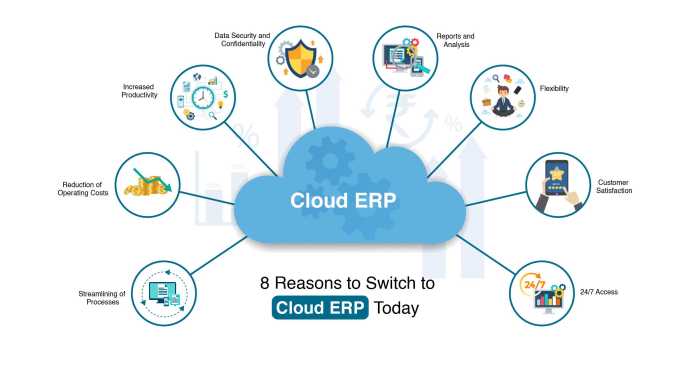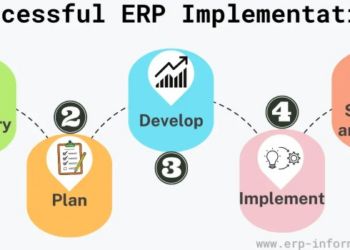Cloud-based ERP solutions revolutionize the way businesses manage their operations, offering flexibility, efficiency, and scalability like never before. Dive into this dynamic landscape to uncover the key aspects of this innovative technology and its impact on modern businesses.
Introduction to Cloud-Based ERP Solutions
Cloud-based ERP solutions refer to Enterprise Resource Planning software that is hosted on remote servers and accessed through the internet. Unlike traditional ERP systems, which are installed on-premises and managed locally, cloud-based ERP solutions are delivered as a service, offering scalability, flexibility, and cost-effectiveness.
Differences between Cloud-Based ERP Solutions and Traditional ERP Systems
- Accessibility: Cloud-based ERP solutions can be accessed from anywhere with an internet connection, while traditional ERP systems are limited to on-site access.
- Cost: Cloud-based ERP solutions typically have lower upfront costs and are subscription-based, making them more affordable for small to medium-sized businesses.
- Scalability: Cloud-based ERP solutions can easily scale up or down based on business needs, whereas traditional ERP systems may require additional hardware and resources for expansion.
- Maintenance: Cloud-based ERP solutions are maintained and updated by the provider, reducing the burden on in-house IT teams, unlike traditional ERP systems that require manual updates and maintenance.
Benefits of Using Cloud-Based ERP Solutions
- Flexibility: Cloud-based ERP solutions offer greater flexibility in terms of access, customization, and integration with other software applications.
- Cost-Effectiveness: With lower upfront costs and pay-as-you-go pricing models, cloud-based ERP solutions can be more cost-effective for businesses of all sizes.
- Scalability: Cloud-based ERP solutions can easily scale to accommodate growth or changes in business operations without the need for significant investments in hardware or infrastructure.
- Security: Cloud-based ERP solutions often come with advanced security features and regular updates to protect data from cyber threats and breaches.
Features of Cloud-Based ERP Solutions
Cloud-based ERP solutions offer a range of features that make them a popular choice for businesses looking to streamline their operations and improve efficiency. Some key features include:
1. Accessibility
Cloud-based ERP solutions can be accessed from anywhere with an internet connection, allowing for greater flexibility and convenience for users.
2. Scalability
Cloud-based ERP systems are highly scalable, making it easy for businesses to adjust their resources and capabilities as needed without the need for significant upfront investment.
3. Cost-effectiveness
Cloud-based ERP solutions often have lower upfront costs compared to on-premise systems, as they eliminate the need for expensive hardware and maintenance.
4. Real-time Data Access
Cloud-based ERP solutions provide real-time access to data, allowing for quick decision-making and improved collaboration among team members.
5. Automatic Updates
Cloud-based ERP systems typically receive automatic updates from the provider, ensuring that businesses always have access to the latest features and security patches.
6. Integration Capabilities
Cloud-based ERP solutions can easily integrate with other software applications, allowing for a more cohesive and efficient workflow across different departments.
7. Data Security
Cloud-based ERP solutions often come with robust security measures to protect sensitive business data, ensuring compliance with data privacy regulations.
Scalability Comparison with On-Premise ERP Systems
Cloud-based ERP solutions offer greater scalability compared to on-premise systems, as businesses can easily scale up or down their resources based on changing needs without the constraints of physical infrastructure.
Real-Time Data Access in Cloud-Based ERP Solutions
Real-time data access in cloud-based ERP solutions is achieved through a centralized database that can be accessed by authorized users simultaneously, ensuring that everyone is working with the most up-to-date information.
Implementation of Cloud-Based ERP Solutions
When it comes to implementing cloud-based ERP solutions, businesses need to carefully plan and execute the migration process to ensure a smooth transition. This involves migrating data, configuring the system, and training employees on how to use the new ERP system effectively.
Migrating to a Cloud-Based ERP System
Migrating to a cloud-based ERP system involves transferring data from legacy systems to the cloud. This process requires careful planning to ensure data integrity and security. Businesses need to assess their current data structure, clean up data, and map data fields to align with the new ERP system.
It is essential to work closely with the ERP provider to facilitate a successful data migration process.
Deployment Options for Cloud-Based ERP Solutions
Cloud-based ERP solutions offer various deployment options, including public cloud, private cloud, and hybrid cloud. Public cloud deployment involves hosting the ERP system on a shared infrastructure, while private cloud deployment offers dedicated resources for the ERP system. Hybrid cloud deployment combines both public and private cloud resources to meet the specific needs of the business.
Businesses need to evaluate their requirements and choose the deployment option that best suits their needs.
Role of Training and Support during Implementation
Training and support are crucial during the implementation phase of cloud-based ERP solutions. Employees need to be trained on how to use the new system effectively to maximize its benefits. Training sessions should be tailored to the specific roles and responsibilities of employees to ensure smooth adoption of the ERP system.
Additionally, ongoing support is essential to address any issues or questions that may arise during the implementation phase. The ERP provider should offer comprehensive training and support services to help businesses navigate the transition to a cloud-based ERP system smoothly.
Security and Compliance in Cloud-Based ERP Solutions

Cloud-based ERP solutions prioritize security and compliance to ensure the protection of sensitive data and adherence to industry regulations.
Security Measures in Cloud-Based ERP Solutions
- Implementing multi-factor authentication to enhance login security.
- Regular security audits and vulnerability assessments to identify and address potential risks.
- Utilizing data encryption to safeguard information during transmission and storage.
- Establishing role-based access control to limit data access to authorized personnel only.
Importance of Data Encryption in Cloud-Based ERP Systems
Data encryption plays a crucial role in cloud-based ERP systems by encoding sensitive information to prevent unauthorized access. This ensures that data remains confidential and secure, even if intercepted by malicious entities. By encrypting data at rest and in transit, cloud-based ERP solutions maintain the integrity and confidentiality of critical business information.
Ensuring Compliance with Industry Regulations
Cloud-based ERP solutions adhere to industry regulations by incorporating features that facilitate compliance, such as:
- Automated compliance checks to ensure adherence to regulatory requirements.
- Integration with compliance management tools to streamline regulatory processes.
- Regular updates to align with changing regulatory landscapes and standards.
- Secure audit trails to track data access and modifications for compliance purposes.
Last Point
In conclusion, cloud-based ERP solutions emerge as a game-changer in the realm of business management, providing a secure, efficient, and adaptable platform for organizations to thrive in the digital age. With its myriad benefits and advanced features, embracing cloud-based ERP solutions is undoubtedly a strategic move for any forward-thinking enterprise.
Expert Answers
How does cloud-based ERP differ from traditional ERP systems?
Cloud-based ERP systems are hosted on remote servers accessed through the internet, while traditional ERP systems are installed on local servers and require on-site maintenance and management. This key distinction impacts factors like cost, scalability, and accessibility.
What are the key security measures in cloud-based ERP solutions?
Cloud-based ERP solutions implement robust security protocols such as encryption, multi-factor authentication, regular data backups, and compliance with industry standards like GDPR and HIPAA to ensure data protection and confidentiality.
How is real-time data access achieved in cloud-based ERP solutions?
Real-time data access in cloud-based ERP solutions is enabled through constant synchronization between the cloud servers and user devices, allowing instant updates and access to real-time information for informed decision-making.










